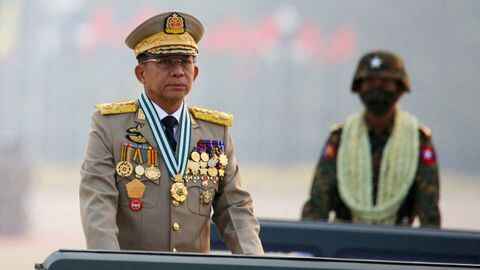As the prosecutor promises responsibility for Myanmar’s crimes against Rohingya refugees in cooperation with international partners, the ICC investigation broadens.
On Wednesday, the chief prosecutor for the International Criminal Court requested that judges issue an arrest warrant for the leader of Myanmar’s military dictatorship in connection with crimes against the Rohingya Muslim minority.
The deportation and persecution of the Rohingya are alleged to be crimes against humanity committed by Gen. Min Aung Hlaing, who succeeded elected leader Aung San Suu Kyi in a coup in 2021.
In order to avoid what has been described as an ethnic cleansing effort that included mass rapes, massacres, and home burning, over a million people were compelled to flee to neighboring Bangladesh.
Karim Khan, the court’s senior prosecutor, said in a statement from a refugee camp in Bangladesh that he plans to ask for further warrants for Myanmar’s leaders shortly.
By doing this, we and all of our partners will be proving that the Rohingya are not forgotten. that they are entitled to legal protection, just like everyone else in the globe,” the British lawyer stated.
According to the charges, Myanmar’s military launched a counterinsurgency campaign in August 2017 after an insurgent attack. Hlaing, who is in charge of the Myanmar Defence Services, is accused of ordering the Tatmadaw, the country’s military, and the national police to attack Rohingya civilians.
Khan spoke with Rohingya people who had been displaced while he was in Bangladesh.
The global court’s absence
Bangladesh is a member of the global court, while Myanmar is not. In 2018, the court’s judges decided that the prosecutor might investigate offenses like coercive removal that were “completed” on a member state’s territory.
In 2019, Fatou Bensouda, Khan’s predecessor, formally asked for an investigation into the situation, and judges approved the opening of an investigation into “any crime, including any future crime” connected to the Rohingya that was at least partially committed in Bangladesh or another court member state.
In addition to pushing men, women, and children across the border and into refugee camps, the action opened the door for Khan to commit other crimes.
The proposal comes days after the military-led administration suffered yet another defeat when a strong rebel group took control of a wealthy rare earth mining hub and a major commerce town in northeastern Myanmar near the Chinese border.
After the military overthrew Aung San Suu Kyi’s administration in February 2021, long-standing armed militias led by ethnic minority groups in Myanmar’s border regions—who had fought for decades for greater autonomy—began to engage in more intense combat.
In 2022, Gambia filed a new action against Myanmar in the United Nations’ top court, the International Court of Justice, claiming the Southeast Asian country committed genocide against the Rohingya.
Canada and five European nations have requested that the court support Gambia in the case.






